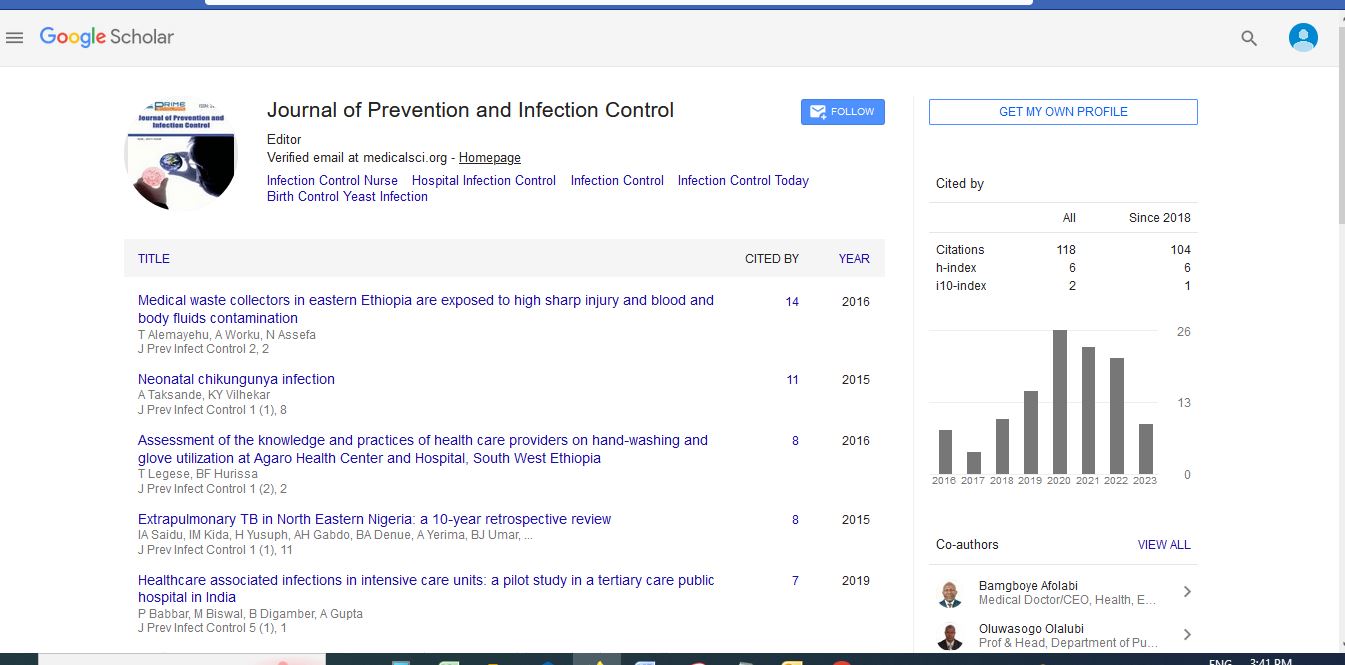Short Communication - (2024) Volume 10, Issue 2
The Importance of Hygiene: A Comprehensive Guide to Healthy Living
Misaki Yamamoto*
Department of Medical Science, Kanazawa University, Japan
*Correspondence:
Misaki Yamamoto,
Department of Medical Science, Kanazawa University,
Japan,
Email:
Received: 29-May-2024, Manuscript No. IPJPIC-24-20112;
Editor assigned: 31-May-2024, Pre QC No. IPJPIC-24-20112 (PQ);
Reviewed: 14-Jun-2024, QC No. IPJPIC-24-20112;
Revised: 19-Jun-2024, Manuscript No. IPJPIC-24-20112 (R);
Published:
26-Jun-2024, DOI: 10.36648/2471-9668-10.2.12
Introduction
Maintaining good hygiene practices is fundamental to our overall
health and well-being. From preventing illness to promoting selfconfidence,
hygiene plays a crucial role in our daily lives. In this
article, we will explore the significance of hygiene and provide
practical tips for maintaining cleanliness in various aspects of our
lives. Personal hygiene encompasses practices that individuals
undertake to maintain cleanliness and promote health. This
includes regular bathing or showering, brushing teeth, washing
hands, and grooming habits. Practicing good personal hygiene
helps prevent the spread of germs and reduces the risk of
infections and diseases. Regular bathing removes sweat, dirt,
and bacteria from the skin, preventing body odour and skin
infections. Using soap and water to wash hands effectively
removes harmful bacteria and viruses, reducing the likelihood
of contracting illnesses such as colds, flu, and food poisoning.
Additionally, proper oral hygiene, including brushing teeth twice
a day and flossing, helps prevent dental problems such as cavities
and gum disease.
Description
Environmental hygiene involves maintaining cleanliness in
our surroundings, including our homes, workplaces, and
public spaces. Keeping these environments clean helps
prevent the spread of pathogens and reduces the risk of
infections. In the home, regular cleaning of surfaces, floors,
and commonly touched objects such as doorknobs and light
switches helps eliminate germs. Proper storage and handling
of food also contribute to environmental hygiene by preventing
contamination and foodborne illnesses. In workplaces and public
spaces, maintaining cleanliness through regular cleaning and
disinfection is essential for the health and safety of employees
and visitors. This includes sanitizing shared equipment and hightouch
surfaces, such as desks, keyboards, and handrails. Food
hygiene refers to practices that ensure the safety and cleanliness
of food from production to consumption. Poor food hygiene can
lead to foodborne illnesses caused by harmful bacteria, viruses,
and parasites. Practicing good food hygiene involves proper
handling, storage, and preparation of food. This includes washing
hands before and after handling food, separating raw and cooked
foods to prevent cross-contamination, cooking food thoroughly
to kill bacteria, and storing food at the correct temperature to
prevent spoilage. In addition to its physical benefits, maintaining
good hygiene also has positive effects on mental health and
well-being. Feeling clean and presentable can boost self-esteem
and confidence, improving overall mental health. Establishing a
regular hygiene routine can also promote feelings of control and
stability, particularly during times of stress or uncertainty. Taking
care of oneself through hygiene practices reinforces a sense of
self-worth and self-respect [1-4].
Conclusion
In conclusion, hygiene is a cornerstone of healthy living,
encompassing personal, environmental, and food-related
practices. By prioritizing cleanliness and adopting good hygiene
habits, we can protect ourselves and others from illness,
promote overall well-being, and enhance our quality of life.
Incorporating simple hygiene practices into our daily routines can
have a profound impact on our health and happiness, making it
an essential aspect of our lives. Hygiene is crucial for preventing
the spread of diseases and maintaining overall health. Regular
handwashing, proper sanitation, and cleanliness help eliminate
germs and bacteria that can cause illnesses like colds, flu, and
gastroenteritis. In healthcare settings, hygiene protocols are
critical for preventing hospital-acquired infections. By practicing
good hygiene, individuals contribute to a healthier community
and reduce the burden on healthcare systems, promoting a
higher quality of life for everyone.
Acknowledgement
None.
Conflict Of Interest
None.
References
- Lahiri A, Lahiri A, Iyer N, Das P, Chakravortty D, et al. (2010) Visiting the cell biology of salmonella infection. Microbes Infect 12(11):809-18.
[Crossref] [Google Scholar] [PubMed]
- Duong TA (1996) Infection due to Penicillium marneffei, an emerging pathogen: review of 155 reported cases. Clin Infect Dis 23(1):125-30.
[Crossref] [Google Scholar] [PubMed]
- Lyczak JB, Cannon CL, Pier GB (2000) Establishment of Pseudomonas aeruginosa infection: Lessons from a versatile opportunist. Microbes Infect 2(9):1051-60.
[Crossref] [Google Scholar] [PubMed]
- Rikihisa Y (1999) Clinical and biological aspects of infection caused by Ehrlichia chaffeensis. Microbes Infect 1(5):367-76.
[Crossref] [Google Scholar] [PubMed]
Citation: Yamamoto M (2024) The Importance of Hygiene: A Comprehensive Guide to Healthy Living. J Prevent Infect Control. 10:12.
Copyright: © 2024 Yamamoto M. This is an open-access article distributed under the terms of the Creative Commons Attribution License, which permits unrestricted use, distribution, and reproduction in any medium, provided the original author and source are credited.

